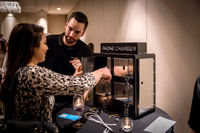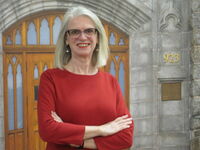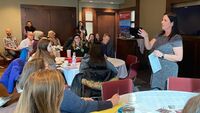By Chris Benjamin |
Sobey School of Business students devised improved agricultural methods, a financial literacy program for inmates, public-use cell phone-charging stations, and a social media platform for Chinese ex-pats, and they took home four of six BOYNECLARKE Innovative Ideas Awards on February 23 at the Westin Nova Scotian in Halifax. They swept the social innovation category, winning all three awards in that arena.
The exceptional performance by Sobey students builds on last year’s win by OPtions Peru, a project of Enactus, a Saint Mary’s social entrepreneurship society ranked third in Canada and focused on “using the power of entrepreneurial action to transform lives and shape a better, more sustainable world.” The Sobey School of Business has cultivated a reputation as a centre for entrepreneurial excellence with important social benefits locally and globally.
“We don’t even have a course in social enterprise; it’s woven in and that’s the strength of its exposure,” says Tim Cranston, a Master of Technology Entrepreneurship and Innovation (MTEI) student whose Afri-Sea technology won first place in the Social Stream at the awards.
Afri-Sea is a means to turn coastal sea plants into a sustainable alternative to chemical fertilizers, reducing the impact of drought on farming communities. The Gambian government has already endorsed the technology and the World Bank is now reviewing it.
Cranston credits MTEI director Dawn Jutla for creating a program that marries technological and sociological innovation with proven entrepreneurship models in a global context. “It’s about understanding how you would work in a specific context,” he says, “the local ethnicities, religions, social stratifications, etc.” He also knows success—his and that of the program—can never be entirely credited to an individual. “I’m happy for the school,” he says. “Four of six finalists from SMU and that speaks for itself. I get the feeling there’s a lot of people engaged in supporting the students.”
““Extra-curricular activities such as this competition are key drivers of student success.” -Jason Turner
Jason Turner is one of those people. He’s part of the Enactus team and a faculty advisor. He concurs with Cranston’s assessment.
“We have a Dean in Dr. Patricia Bradshaw who goes out of her way to support students,” he says. “We have former competition winners, since graduated, happy to meet with current students. And we have the Sobey School Business Development Centre (SSBDC) and the various supports and services they provide in preparing students to be entrepreneurs or at the very least, entrepreneurial.”
Ellen Farrell is another one of SMU’s entrepreneurial champions. She teaches entrepreneurship and has mentored hundreds of SMU students who have gone on to become leaders in business communities locally and abroad, including multiple winners of the BMO Apex Business Plan Competition for aspiring entrepreneurs. She tapes clippings of them in the newspapers to her office door.
“It’s amazing what a few minutes of direction and encouragement can do,” she said last year, after becoming a finalist herself for the Business Development Bank of Canada Mentorship Award.
Collectively, Jutla, Bradshaw, Farrell, Turner and many others have created a dazzling array of supports for entrepreneurial students. Turner also helps facilitate the Spark Zone, a multi-campus—including SMU, MSVU, NSCAD and NSCC—sandbox program started last year.
A “sandbox” is a sort of lab for entrepreneurs to experiment, bouncing ideas off mentors like Farrell and other successful business leaders already working in the community. As Premier Stephen McNeil said when the province announced sandbox funding last year, “encouraging innovation is fundamental to the change our province needs.”
Recognizing that need, the Sobey School Business Development Centre also offers the innovative Startup 100 program, which is connecting 100 student entrepreneurs across the province to interest-free startup loans, and to one another. They will network with each other and mentors in their respective communities as they start 100 new business ventures.
The Startup 100 program is typical of the school’s focus on not only teaching the best models, but putting thought into action and changing the world. Encouraging students to participate in competitions like the Innovative Ideas Awards goes a long way. For example, winners get seed money to help them advance their ideas. “Extra-curricular activities such as this competition are key drivers of student success,” explains Jason Turner. “For some they provide a healthy outlet for their competitive nature while others benefit from learning to craft a pitch in a pressure-packed environment.”
For Turner, the awards are an important piece of positive recognition, but the results of his efforts go beyond mere awards. They are most importantly manifested in the work of the students as entrepreneurs.
Having started sitting in a classroom learning about effective business models, they moved into competitions and participation with Enactus, and then into launching valuable programs. Students have created initiatives empowering marginalized women in Peru with business and entrepreneurship skills, helping soon-to-be-released women in provincial prison become entrepreneurs providing for their families, community development projects in Halifax’s Mulgrave Park, and a social media network facilitating adaptation for newcomers.
“Students conceive and develop their own projects and have support from a variety of university entities,” Turner says.
Graduates will emerge with an entrepreneurial attitude toward solving fundamental human problems. Not every business will succeed, but that’s not really the point.




